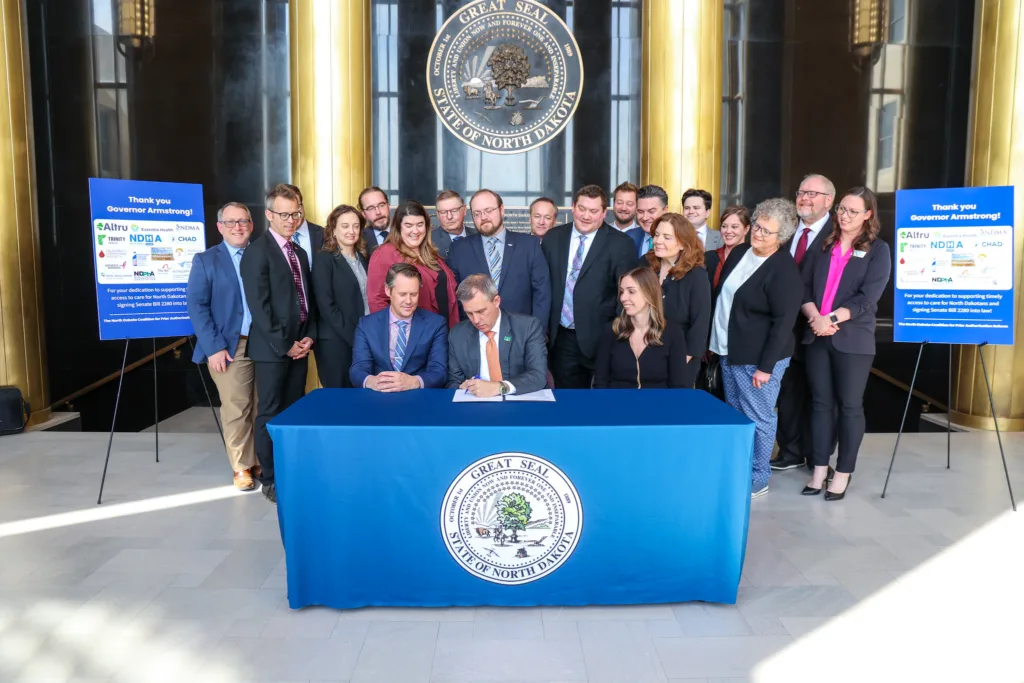

By: Ben Hanson
North Dakotans want to keep their family members and the state’s workforce healthy.
When health care isn’t prioritized, small issues can quickly turn into large problems and treatable conditions can become life-threatening, such as late-stage cancer. When the time comes to make an appointment, everyone wants the same things: simplicity, accessibility and affordability.
All the data indicates, and headlines tell us, that cutting through red tape to ensure health care access and avoiding medical debt are top-of-mind issues. They can be some of the most frustrating parts of our lives.
This year the North Dakota Legislature did something about it.
By passing laws reforming insurance company practices on prior authorization and copay accumulator adjustments, the North Dakota Legislature made the health care process easier for those who need it most, including cancer patients and others with serious illnesses.
Prior authorization was once used sparingly by insurers to determine whether costly medical procedures or medications were needed. But the process has devolved into a system requiring providers to get approval to prescribe even the most routine medications and procedures.
Physicians report the process can lead to significant delays in care, contributing to negative outcomes for patients, including abandoned treatment altogether. Senate Bill 2280 standardizes the prior authorization process and establishes time limits for review – 72 hours in cases of emergency or seven calendar days for more routine requests — helping those in need of critical medical care avoid prolonged delays in treatment. It also eliminates artificial intelligence and business consultant overview from the process, making sure a doctor is doing the authorization and not a bot or bean counter.
We are so grateful to the bill’s primary sponsor, Sen. Scott Meyer of Grand Forks, with Sens. Jeff Barta (Grand Forks), Brad Bekkedahl (Williston) and Sean Cleary (Bismarck) co-sponsoring in the Senate and Reps. Jonathan Warrey (Casselton) and Jon Nelson (Rugby) in the House.
For the more than 4,500 North Dakotans who will be diagnosed with cancer in 2025, this legislation is a major step forward in making their treatment process less about red tape and more about recovery.
Legislation sponsored by Rep. Karen Karls of Bismarck, House Bill 1216 requires all prescription drug copayments made by patients, directly or on their behalf, to count toward their overall out-of-pocket maximum or deductible. This law essentially ends an insurance company practice that did not allow payments from outside entities to count toward a patient’s out-of-pocket cost obligations.
Real life example: A cystic fibrosis patient received $5,000 in copay assistance to help with prescription drug out-of-pocket cost. That amount would cover the patient’s copay for the year, saving her $5,000. Under the old rules, the copay assistance would not count, and she would still have to pay $5,000 to meet her deductible or out-of-pocket maximum before her health plan started paying for her subsequent health care costs. It’s like getting a scholarship to attend college but having the university keep the money … and your tuition remains the same.
That amount of money is life-changing for many, many North Dakotans. The new law will help ease the financial burden of some patients, many of whom are fully inundated with debt already. A 2022 American Cancer Society Cancer Action Network study found 31% of cancer patients noted paying for prescriptions as a challenge and 20% indicated that financial considerations had caused them to skip or delay taking prescribed medication.
As always, we should celebrate the wins, but there is always more that needs doing.
One piece of legislation that did not advance this session involved diagnostic and supplemental breast cancer screenings. House Bill 1283 would have required all state-regulated health policies to eliminate patient out-of-pocket costs for medically necessary diagnostic and supplemental breast imaging.
Essentially, it would require breast diagnostic mammograms, breast ultrasounds, and breast magnetic resonance imaging (MRI) scans be covered by insurers at no-cost-share when needed after an abnormal initial screening or because of personal risk factors. Mammograms are a great detection tool and, for many, enough to give a full and clear breast cancer screening. But other patients need more and this legislation would have required insurance companies to pay the bill when doctors indicated additional tests were required to get that full and clean bill of health.
Legislation around biomarker testing is also in the future here. Biomarker testing is about identifying the most effective treatment for patients with cancer and other serious illnesses. It can open the door to precision treatments that can improve outcomes and quality of life for patients with many diseases and conditions. Biomarker testing can allow some patients to access targeted therapies and avoid more generalized treatments like chemo. It’s about precision medicine, making sure folks get the right treatment at the right time. Similar legislation has been enacted in 21 states including Texas and Georgia. North Dakota is falling behind best practices in this regard, a situation that needs remedied.
It was a good session for North Dakotans who need health care. Which is to say, for all North Dakotans. We are grateful for the steps taken and look forward to moving ahead further in the months and sessions to come.